7 books about Kleinberg-Levin, David Michael
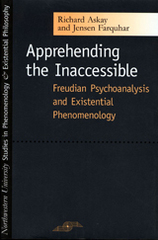
Apprehending the Inaccessible
Freudian Psychoanalysis and Existential Phenomenology
Richard Askay and Jensen Farquhar
Northwestern University Press, 2006
Throughout history philosophers have relentlessly pursued what may be called "inaccessible domains." This book explores how the traditions of existential phenomenology relate to Freudian psychoanalysis. A clear, succinct, and systematic account of the philosophical presuppositions of psychoanalytic theory and practice, this work offers a deeper and richer understanding and appreciation of Freudian thought, as well as its antecedents and influences.
With its unique perspective on Freud's work, Apprehending the Inaccessible puts readers in a better position to appreciate his contributions and evaluate the relationship between his and other philosophical world views. The authors, both of whom have extensive backgrounds in philosophy and psychology, present balanced critical analyses of crucial developments in, for example, the evolution of the Freudian notion of the unconscious, and the engagement of existential phenomenology with Freudian psychoanalysis. Askay and Farquhar then consider—often for the first time—individual thinkers' reflections on and interpretations of Freud, ranging from the primary figures in existential phenomenology to the most prominent figures in the existential psychoanalytic movement. Even as their work offers a new approach to Freudian thought, it reasserts the importance of alternative views found in existential phenomenology as those views pertain to psychoanalysis and the question of apprehending the inaccessible.
With its unique perspective on Freud's work, Apprehending the Inaccessible puts readers in a better position to appreciate his contributions and evaluate the relationship between his and other philosophical world views. The authors, both of whom have extensive backgrounds in philosophy and psychology, present balanced critical analyses of crucial developments in, for example, the evolution of the Freudian notion of the unconscious, and the engagement of existential phenomenology with Freudian psychoanalysis. Askay and Farquhar then consider—often for the first time—individual thinkers' reflections on and interpretations of Freud, ranging from the primary figures in existential phenomenology to the most prominent figures in the existential psychoanalytic movement. Even as their work offers a new approach to Freudian thought, it reasserts the importance of alternative views found in existential phenomenology as those views pertain to psychoanalysis and the question of apprehending the inaccessible.
[more]
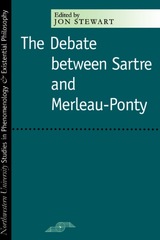
The Debate Between Sartre and Merleau-Ponty
Jon Stewart
Northwestern University Press, 1998
The Debate between Sartre and Merleau-Ponty provides a balanced portrait of the intellectual relationship between these two men. Essays by leading scholars as well as selections from the primary texts of Merleau-Ponty, Sartre, and Simone de Beauvoir address the numerous points of contact and cover the major themes of the debate from the different periods in their shared history. A biographical overview introduces the work and provides a context for the theoretical issues taken up in the articles, and an extensive bibliography suggests further readings to supplement the selections included in the volume.
[more]
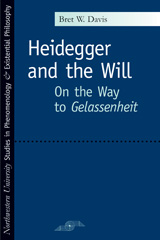
Heidegger and the Will
On the Way to Gelassenheit
Bret W. Davis
Northwestern University Press, 2007
The problem of the will has long been viewed as central to Heidegger's later thought. In the first book to focus on this problem, Bret W. Davis clarifies key issues from the philosopher's later period—particularly his critique of the culmination of the history of metaphysics in the technological "will to will" and the possibility of Gelassenheit or "releasement" from this willful way of being in the world—but also shows that the question of will is at the very heart of Heidegger's thinking, a pivotal issue in his path from Being and Time (1926) to "Time and Being" (1962).
Moreover, the book demonstrates why popular critical interpretations of Heidegger's relation to the will are untenable, how his so-called "turn" is not a simple "turnaround" from voluntarism to passivism. Davis explains why the later Heidegger's key notions of "non-willing" and "Gelassenheit" do not imply a mere abandonment of human action; rather, they are signposts in a search for an other way of being, a "higher activity" beyond the horizon of the will. While elucidating this search, his work also provides a critical look at the ambiguities, tensions, and inconsistencies of Heidegger's project, and does so in a way that allows us to follow the inner logic of the philosopher's struggles. As meticulous as it is bold, this comprehensive reinterpretation will change the way we think about Heidegger's politics and about the thrust of his philosophy as a whole.
Moreover, the book demonstrates why popular critical interpretations of Heidegger's relation to the will are untenable, how his so-called "turn" is not a simple "turnaround" from voluntarism to passivism. Davis explains why the later Heidegger's key notions of "non-willing" and "Gelassenheit" do not imply a mere abandonment of human action; rather, they are signposts in a search for an other way of being, a "higher activity" beyond the horizon of the will. While elucidating this search, his work also provides a critical look at the ambiguities, tensions, and inconsistencies of Heidegger's project, and does so in a way that allows us to follow the inner logic of the philosopher's struggles. As meticulous as it is bold, this comprehensive reinterpretation will change the way we think about Heidegger's politics and about the thrust of his philosophy as a whole.
[more]
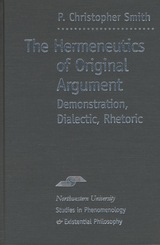
The Hermeneutics of Original Argument
Demonstration, Dialectic, Rhetoric
P. Christopher Smith
Northwestern University Press, 1998
What, precisely, does the word hermeneutics mean? And in what sense can one speak of the hermeneutics of original argument? In The Hermeneutics of Original Argument, P. Christopher Smith explores these questions in building upon Heidegger's hermeneutical thought. In applying Heidegger's basic notion that hermeneutics is not a doctrine of interpretation but is its actual execution, Christopher Smith penetrates the abstractions that conceal original argument and explores the structure and nature of argument as it originally occurs.
[more]
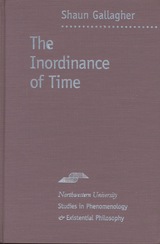
The Inordinance of Time
Shaun Gallagher
Northwestern University Press, 1998
The Inordinance of Time develops an account of the experience of time at the intersection of three approaches: phenomenology, cognitive science, and post-structuralism. Using insights developed in both the phenomenological and cognitive traditions Gallagher explores the inadequacies of the existing models, the limitations imposed by introspective reflection, concepts of intentionality and embodied existence, and the extra-intentional processes that govern the operations of consciousness and memory.
[more]
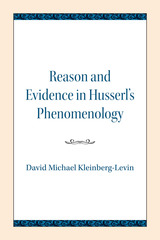
Reason and Evidence in Husserl's Phenomenology
David Michael Kleinberg-Levin
Northwestern University Press, 1970
In Reason and Evidence in Husserl's Phenomenology David Michael Kleinberg-Levin examines Husserl’s concept of necessary, a priori, and absolutely certain indubitable evidence, which he terms apodictic, and his related concept of complete evidence, which he terms adequate. To do so it explicates some of the more general relevant features of phenomenology as a whole.
[more]
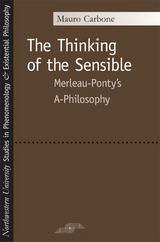
The Thinking of the Sensible
Merleau-Ponty's A-Philosophy
Mauro Carbone
Northwestern University Press, 2004
In this first English publication of a well-known and widely respected Italian scholar, readers will encounter the preeminent interpreter of the works of Maurice Merleau-Ponty engaged in a dialogue of critical concern to contemporary philosophy. In subtle and sensitive language eminently suited to the style and substance of Merleau-Ponty's own writings, Mauro Carbone fashions four essays around a central theme-the relations of the sensible and the intelligible, and of philosophy and non-philosophy-that occupied Merleau-Ponty in his later work.
An original and innovative interpretation of the ontology of Merleau-Ponty--and themselves a significant contribution to the field of Continental thought--these essays constitute a sustained exploration of what Merleau-Ponty detected, and greeted, as a "mutation within the relations of man and Being," which would provide him with the basis for a new idea of philosophy or "a-philosophy." In lucid, often elegant terms, Carbone analyzes key elements of Merleau-Ponty's thought in relation to Proust's Recherche, Hegel's Phenomenology of Spirit, the new biology of Von Uexküll, Rimbaud's Lettre du voyant, and Heidegger's conception of "letting-be." His work clearly demonstrates the vitality of Merleau-Ponty's late revolutionary philosophy by following its most salient, previously unexplored paths. This is essential reading for any scholar with an interest in Merleau-Ponty, in the questions of embodiment, temporality and Nature, or in the possibility of philosophy today.
An original and innovative interpretation of the ontology of Merleau-Ponty--and themselves a significant contribution to the field of Continental thought--these essays constitute a sustained exploration of what Merleau-Ponty detected, and greeted, as a "mutation within the relations of man and Being," which would provide him with the basis for a new idea of philosophy or "a-philosophy." In lucid, often elegant terms, Carbone analyzes key elements of Merleau-Ponty's thought in relation to Proust's Recherche, Hegel's Phenomenology of Spirit, the new biology of Von Uexküll, Rimbaud's Lettre du voyant, and Heidegger's conception of "letting-be." His work clearly demonstrates the vitality of Merleau-Ponty's late revolutionary philosophy by following its most salient, previously unexplored paths. This is essential reading for any scholar with an interest in Merleau-Ponty, in the questions of embodiment, temporality and Nature, or in the possibility of philosophy today.
[more]
READERS
Browse our collection.
PUBLISHERS
See BiblioVault's publisher services.
STUDENT SERVICES
Files for college accessibility offices.
UChicago Accessibility Resources
home | accessibility | search | about | contact us
BiblioVault ® 2001 - 2025
The University of Chicago Press









